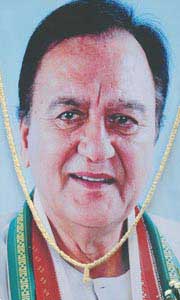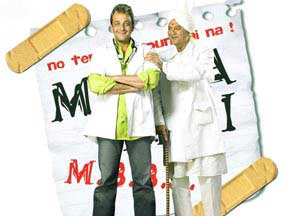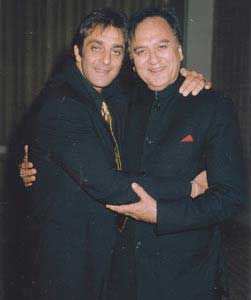Arts
The Final Journey

Sunil Dutt reflects on his life and films in one of his last interviews, months before his May 25 death.
|
He lost his father when he was 5, his family was rendered penniless and homeless by the ravages of partition, and yet Sunil Dutt roughed through life with passion and grace. A successful radio career led to a foray into films. Mother India catapulted him to fame and brought the luminous Nargis into his life. The charismatic couple were renowned for their generosity, patriotism, and charitable efforts. They reaped the love of fans on screen for their formidable talent and off screen for their philanthropy.
Life threw many curve balls at Sunil Dutt. He lost Nargis and a daughter in law to cancer, stood by his son Sanjay, who first battled drug addiction and later was arrested on charges of involvement in terrorism. Sunil Dutt survived close encounters with death, but never lost his zest for life. The public adulation he commanded is attested by the five parliamentary elections he won and in the thousands of mourners who took to the street, delaying his final yatra to the crematorium by over two hours. In an exclusive interview with Little India’s Kavita Chhibber, a few months before his sudden death on May 25, Sunil Dutt reminisced about his life, his transition from films to politics, and why the bend in the road was never the end of the road for him. I have grown up hearing about you and Nargisji, because my aunt was married to your cousin. Those times were the golden ones and as a young kid, I was always awestruck by the aura that surrounded both of you. And yet the beginnings were not as golden. My father died when I was 5 and my brother Som was an infant. My mother was only 22. We are originally from Khurd, in Punjab, and when partition happened, my family left in an army truck that carried them to a refugee camp. My mother did not even have time to bring any jewelry. My uncle was the only Hindu among his Muslim brethren. They had been our friends, tilled our land, and been like family, and yet he had to leave to save his life. It is never people who are good or bad. Circumstances make us what we are. It was my mother who encouraged me to look forward. With her permission I later moved to Bombay to study and find a good job. Bombay must have been very different in those days. Life was simple and so were the people. We could do with little money and still have fun. No five star hotel cuisine can compare to the food we had at the little dhabas and road side places. It was in Bombay that I was offered a job to host a radio program. I had to interview film stars and the program was very successful. While working on another program I came into contact with many film directors and was offered my first film Railway Platform. I made it a point to finish college, because it was my mother’s dream, and then accepted the role. It was Mother India that catapulted you to fame. And you fell in love! Your story seemed straight out of story books. Is that where you first met Nargisji? Your cousin Tilak Raj Dutt used to tell me that he always knew you had a crush on Nargisji because he asked you if there were any actresses worth writing home about and you said there were none except Nargis!
Actually I saw her first at a premiere. She had a luminous aura, a rare beauty of goodness that shone through. It was as if she was from another world and beyond reach. Her generosity and kindness was something I discovered later when she took my ailing sister and had her operated upon quietly even though I didn’t know her very well. I always knew that the woman who would become my wife had to be someone who would be able to take care of my younger brother and sister and keep my mother happy. I realized soon after that she was the woman for me. One day I finally decided that the time had come to tell Nargisji how I felt about her and finally gathered enough courage to tell her on a drive back home how I felt. She didn’t say anything, but a couple of days later she told my sister to tell me her answer was yes. We were always supportive of each other. We formed the Ajanta Arts Cultural Troupe and were able to get leading actors and singers from the film industry, and held stage shows at border areas. Though we often roughed it out, sleeping in tents and shivering in sub-zero temperatures, it was worth it when we saw the joy in the eyes of our Jawans who fought to protect our borders and our people. I know that Nargisji was the only one for me. If she had said no to me, I don’t think I would have ever gotten married. I miss her to this day. Each time my life hits a new milestone, or there is a family celebration or even the hard times, my thoughts always go back to her. She would be so proud of her kids especially Sunjay. You also took up direction at a relatively early age. How much does an actor really learn while being in front of a camera? Well, a lot of actors just prefer to do their bit and go home. On the other hand I was always concerned with total Cinema. I spent a lot of time with Mehboob Khan during the making of Mother India, participating in story sessions, watching him compose shots, edit films. Shortly after, I produced two films, Mujhe Jeene Do and Yeh Raaste Hain Pyar Ke and even though I was only the producer, I remained deeply involved in every aspect of the film. After that I started planning a film revolving around just one actor, but the director did not turn up and at the last minute, I decided to direct the film myself. It was a challenge, but I went ahead, and today I feel very happy that I directed that film, Yaadein, because it was the World’s first feature film with one actor. I should be in the Guinness Book of World Records for that! You have acted in all kinds of films, both of value and the regular masala ones, but the pictures you made yourself always had a social theme.
I think films are such a strong medium, they must be used to portray themes of value and issues that matter. Unfortunately, the majority of today’s films lack that substance, though technically, we have improved a lot. I became a producer and director at a very early stage of my career, and made films that underlined the social values of our times, but very often they were not commercially viable. In fact I was totally wiped out financially after the making of Reshma Aur Shera. It took me 10 years to pay back my debts, and revive my acting career as well. I did act in masala movies as you say, but I knew that I had to remain in the mainstream of Indian Cinema, to make the money I needed for my own films. Your film Yeh Aag Kab Bujhegi on the evils of dowry, was yet another feather in your cap, as was Dard Ka Rishta about a young child suffering from leukemia, and the agony her two parents who are both surgeons go through made soon after Nargisji’s death. Well, I had been very keen to make a film on the evils of dowry. I recall that in 1989, for example, about 600 brides were either burnt or killed or committed suicide, because of the dowry problem. So I was very keen to bring the evils of this practice to the masses, and I’m very glad I made the film. I’m a great admirer of women. They have been a great source of inspiration and I feel that whatever I’m today, is because of the women in my life, whether it was my mother, my sister, sweetheart or wife, or my daughters. My father died when I was five. I still remember my mother’s unflagging energy and her dedication towards her children. In fact I think I have inherited her ability to work non- stop. I had lost my wife to cancer and later my daughter in law. I don’t think people can even begin to imagine what the family goes through and not just the patient. Pain is universal and we are usually bound to each other through pain and the empathy it brings. The Nargis Dutt Cancer Foundation was founded in 1981, and has received so much support throughout the world, thanks to your efforts. There couldn’t be any better way of honoring your late wife’s memory. One morning in New York, my wife who had been battling cancer for ten months and had finally come out of a 2 1/2 month coma after 5 surgeries, sat pensively watching the snow flakes. I thought she was missing her family – she had this great desire to see her son as a bridegroom on a horse. When I asked her she said “I’m not missing my family or worrying about them or myself. I was only thinking that by bringing me here for treatment, you have turned me into a privileged person instead of the commoner I always thought myself to be. How many people can bring their loved ones to this country for treatment? If I ever recover, I’ll see to it that we have similar facilities in our country so that the poorest of the poor can be treated the way I was.” She died before her dream could be fulfilled. It was after her passing away, that I realized, how much love and affection she evoked in people, for it was not just I or the Dutt family, but millions of people who came forward, joined hands, and made her dream come true. Pakistani cricketer Imran Khan and I joined hands many years ago and in one evening raised 100,000 pounds from the Pakistani community in Birmingham, England, for a cancer hospital that he was constructing in Lahore, in his mother’s memory. She died of the same disease. Since then we have raised funds, given medical equipment and buses, and supported India’s first bone marrow transplant. Cancer is on the rise in India. The work is never ending but if you can help one person, if you can share each other’s pain you will always be able to get close to people, and it is one step towards self elevation. Today we see an explosion in drug use and the spread of AIDS in India and what we have done so far as a country is merely a drop in the ocean. You have always been so scrupulously honest and won each time you stood for elections. I recall how your statement that Punjab be renamed Khalistan being widely criticized in Parliament. Do you regret making that statement? How have these political years been over all? An honest politician is an oxymoron, and Congress is not the Congress of the old political stalwarts of our time, who were honorable and had integrity. When one speaks in Parliament, one thinks many times before one utters a word, and I am no exception, so I have never regretted anything that I have said to date. What I had said was if these people remain one of us and Punjab, a land of only 13 districts and 2 rivers is renamed Khalistan, there is no harm in that. After all we have changed the names of so many States- – there was no Maharastra, Gujarat, Mizoram, Nagaland or Tamilnadu for instance. Yes the Congress, the leaders I looked up to, are no longer there, and things have been disheartening and disappointing from time to time, but I believe that one of the greatest qualities any one can possess is loyalty. There are times I have been deeply hurt by what went on around me, but I have never minced my words when I see something that doesn’t seem right and the consequences are a small price to pay for having the courage of one’s conviction. I have a lot of respect for Sonia Gandhi. She has come through a lot. On one hand we call ourselves secular and on the other hand we make an issue of her Italian origins, when she gave so much of herself and let her husband enter politics to serve the country even though she didn’t want it. Her gesture to make Manmohan Singh Prime Minister, even when the tide rose her way, is an example of her compassion and sensitivity, and understanding of what works for India. The arrest of your son under TADA must have been a shocker… Only Bal Thackeray openly supported me. I will always be grateful to Balasaheb for that. Our political views are different, but I respect and admire him in personal life. I think however it has made Sunjay a stronger person and I believe that God never gives you what you cannot handle. He went through a lot when his mother died. After he over came his addiction no one gave him any work. Again when he was arrested people shunned him, but he has bounced back with courage, and what life has put him through has resulted in tremendous growth for him both as an actor and a human being. I’m very proud of him today. Where do you see India and yourself in the near future? It is very exciting to see India emerging from the shadows in an economy that is impacting the world. However we are also bogged down by ignorance, racism and bigotry. I think the youth should be the pride and joy of our nation. We have to guide them and nurture them so they fulfill their true potential, and remain healthy in mind, body and spirit. We have to educate the masses about AIDS and how devastating drugs can be. The NRIs abroad are doing so much. They are so knowledgeable about world politics and are working so hard towards preserving our cultural heritage here. They are giving back both to their local community and to India, and it gives me tremendous hope that things will only get better. I am getting a little tired of politics, but each time I think I have had enough, I realize there is so much left to be done. The love that people have showered on me as an actor, as a politician and as a human being, binds me to them and I realize that as long as the people need me, I will be there for them. I survived a plane crash and paralysis, so I believe God spared me for a higher purpose and what could be greater than serving humanity. |



